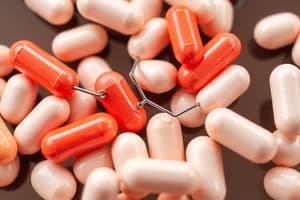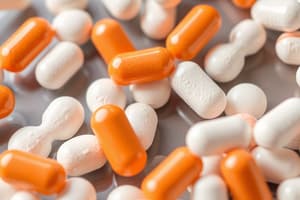Podcast
Questions and Answers
What is the mechanism of action of penicillins, cephalosporins, carbapenems, and monobactams?
What is the mechanism of action of penicillins, cephalosporins, carbapenems, and monobactams?
- Inhibit protein synthesis
- Increase cell membrane permeability
- Inhibit DNA replication
- Inhibit cell wall synthesis (correct)
Which of the following antibiotics is specifically resistant to penicillinase?
Which of the following antibiotics is specifically resistant to penicillinase?
- Cefazolin
- Ceftriaxone
- Meropenem
- Cloxacillin (correct)
Which generation of cephalosporins covers mainly Gram-positive bacteria?
Which generation of cephalosporins covers mainly Gram-positive bacteria?
- Third generation
- Fifth generation
- Second generation
- First generation (correct)
Which antibiotic is effective against MRSA (Methicillin-resistant Staphylococcus aureus)?
Which antibiotic is effective against MRSA (Methicillin-resistant Staphylococcus aureus)?
Which antibiotics have poor penetration into the brain, eye, and prostate?
Which antibiotics have poor penetration into the brain, eye, and prostate?
Which antibiotic class inhibits transglycosylase, preventing the elongation of peptidoglycan and making cells susceptible to lysis?
Which antibiotic class inhibits transglycosylase, preventing the elongation of peptidoglycan and making cells susceptible to lysis?
What is the mechanism of action of Polymyxins B and E (colistin)?
What is the mechanism of action of Polymyxins B and E (colistin)?
Which antibiotic class is known for causing 'Red man syndrome' due to histamine release?
Which antibiotic class is known for causing 'Red man syndrome' due to histamine release?
What is the primary side effect associated with aminoglycosides in addition to their nephrotoxicity?
What is the primary side effect associated with aminoglycosides in addition to their nephrotoxicity?
Which antibiotic class actively divides time between Gram-positive and Gram-negative bacteria?
Which antibiotic class actively divides time between Gram-positive and Gram-negative bacteria?
Which antibiotic class has the MOA of changing the shape of the 30s portion, causing the code on mRNA to be read incorrectly?
Which antibiotic class has the MOA of changing the shape of the 30s portion, causing the code on mRNA to be read incorrectly?
Flashcards are hidden until you start studying
Study Notes
Cell Wall Inhibitors
- Classes include Penicillins, Cephalosporins, Carbapenems, and Monobactams
- Mechanism of action:
- Has a β-lactam ring
- Binds to active site
- Inhibits transpeptidation
- Halts peptidoglycan formation, leading to cell death
Penicillins
- Subgroups:
- Natural (Pen V, G)
- Penicillinase-resistance (Cloxacillin, Oxacillin)
- Broad/extended spectrum (Aminopenicillins, e.g., Amox, Ampi)
- Penicillin + oxapenams (beta-lactamase inhibitor, e.g., Sulbactam, Tazobactam, Clavunic acid)
- 1st, 2nd, 3rd, 4th, and 5th generations, with varying susceptibility to β-lactamase
- Effectiveness against:
- Gram+ bacteria (e.g., Streptococcus pneumoniae)
- Gram- bacteria (e.g., Haemophilus influenza, E. coli, Proteus mirabilis)
Pharmacokinetics and Pharmacodynamics
- Time > MIC (minimum inhibitory concentration)
- Poor penetration in brain, eye, and prostate
- Short half-life (30-90 minutes)
Clinical Uses
- Streptococcal Meningitis
- Meningococcal disease
- Neurosyphilis
- Acute otitis media
- Sinusitis
- Human/animal bite
- Cellulitis and wounds
- Diabetes foot ulcer (DFU)
- Mixed intra-abdominal and pelvic infections
- Skin and soft tissue infections
- UTI
- Surgical prophylaxis
- Pneumonia and sepsis
Side Effects and Contraindications
- Immediate hypersensitivity to penicillins
- Side effects:
- Hypersensitivity
- Stevens-Johnson syndrome (SJS)
- Toxic epidermal necrolysis (TEN)
- Anaphylaxis
- Bone marrow suppression
- Seizures
- Hepatotoxicity
- GI disturbance
- Hematologic and nephrotoxic effects
- Drug interactions:
- Oral contraceptives
- Probenecid (gout)
- Aminoglycosides
- Warfarin
Cell Wall Inhibitors (continued)
Glycopeptides
- Classes:
- Glycopeptides (e.g., Vancomycin)
- Lipoglycopeptides (e.g., Teicoplanin)
- Novel class (e.g., Bacitracin)
- Mechanism of action:
- Inhibits transglycosylase, preventing elongation of peptidoglycan
- Susceptible to lysis
Lipopeptides
- Mechanism of action:
- Binds to cell membrane, causing depolarization and loss of membrane potential
- Rapid cell death
Polypeptides
- Mechanism of action:
- Surface-active amphipathic agents
- Interact with phospholipids, disrupting cell membrane structure
Clinical Uses
- MRSA
- Clostridium difficile
- UTI
- MRSA and VRE
- Skin and soft tissue infections
- Bacteremia
- Endocarditis
- E. coli
- Enterobacter
- Klebsiella
- Salmonella
- MDRO (Multidrug-resistant organisms)
Side Effects and Contraindications
- Red man syndrome (due to histamine release)
- Nephrotoxicity
- Ototoxicity
- Myopathy
- Muscle weakness
- Apnea
- Neurological reactions
- Drug interactions:
- Statins (myopathy/rhabdomyolysis)
- NMB (Neuromuscular blockers)
30S Ribosomal Inhibitors
- Classes:
- Aminoglycosides
- Tetracycline
- Mechanism of action:
- Changes shape of 30S portion, causing incorrect mRNA reading
- Interferes with tRNA attachment to mRNA-ribosome complex
Studying That Suits You
Use AI to generate personalized quizzes and flashcards to suit your learning preferences.




